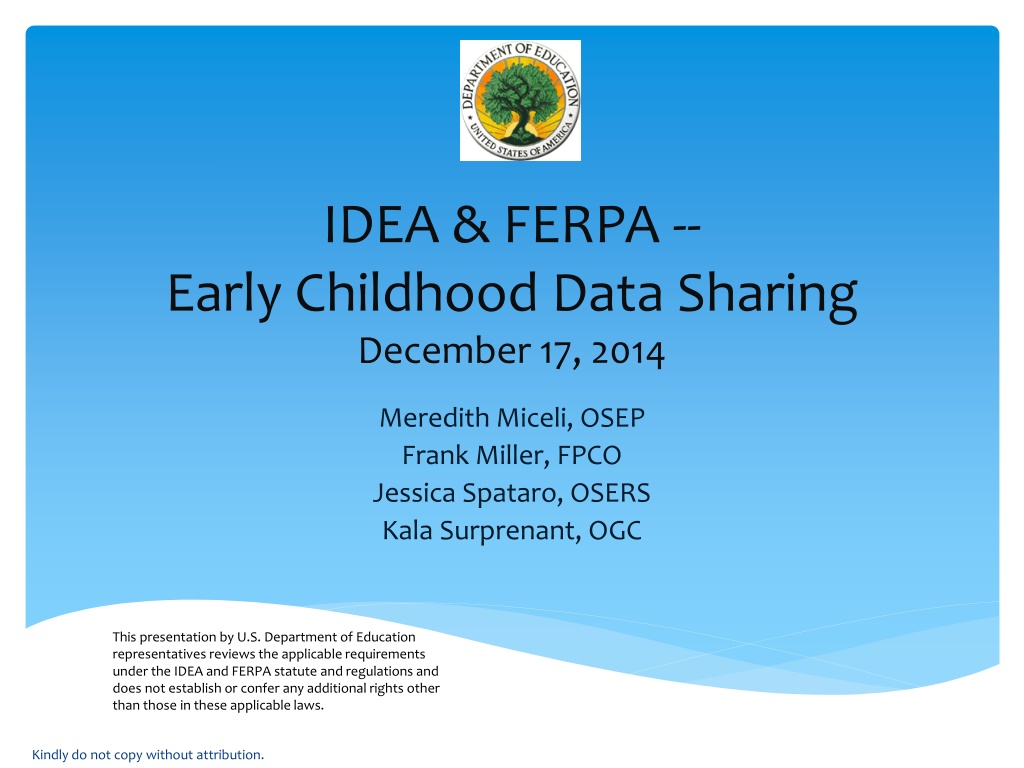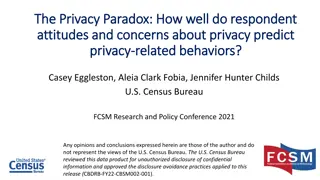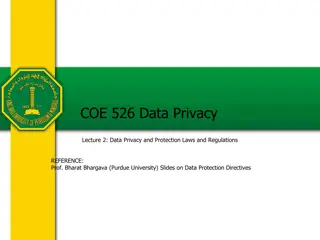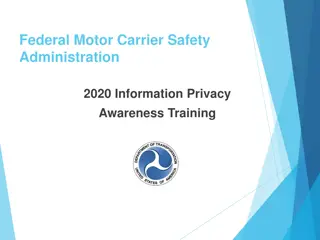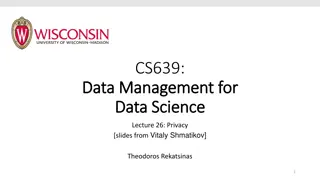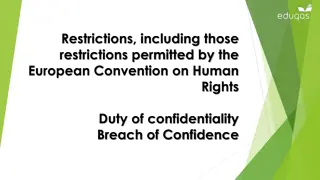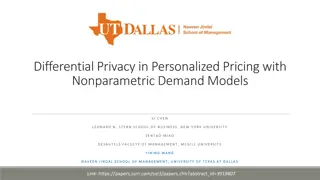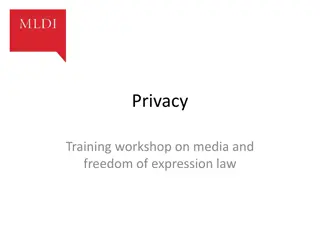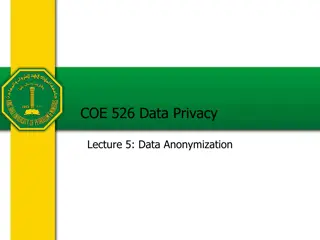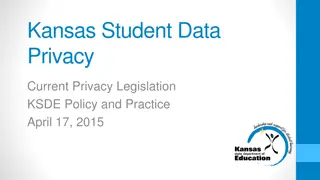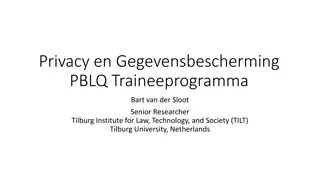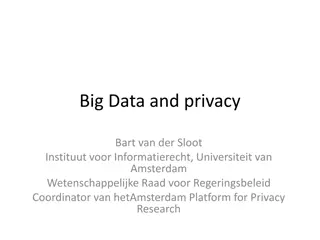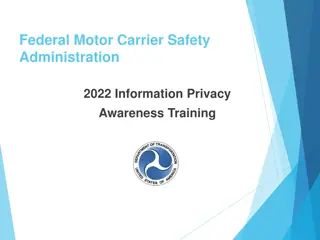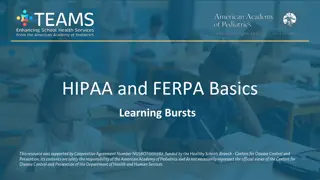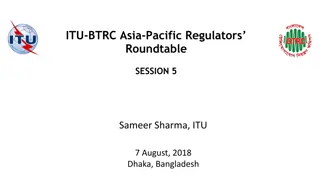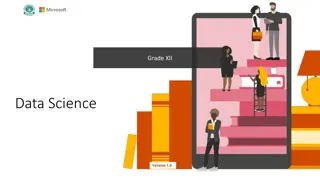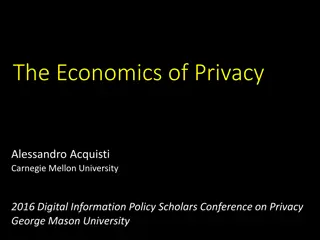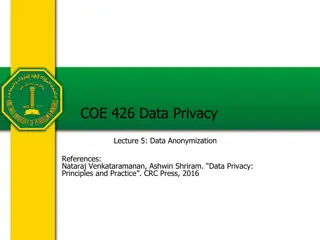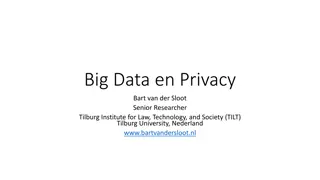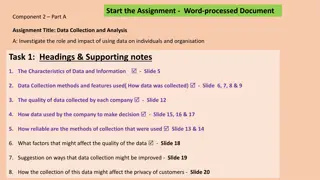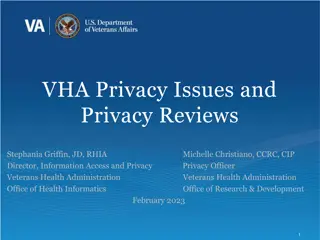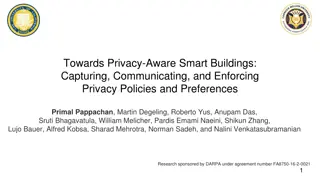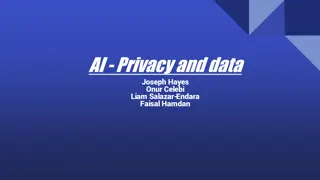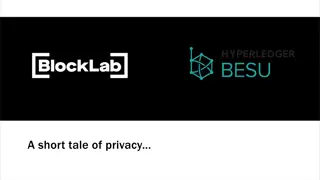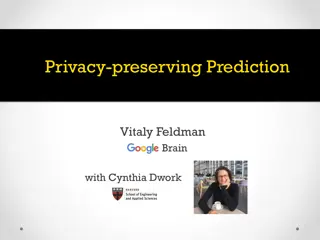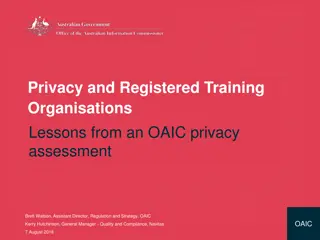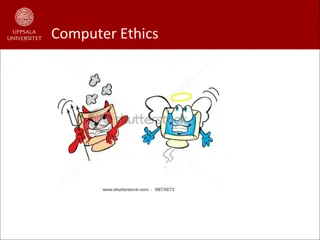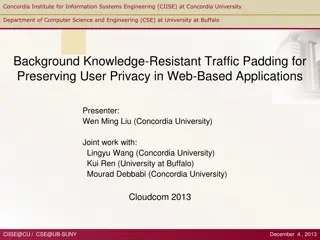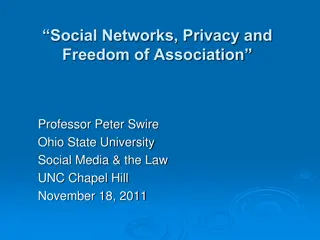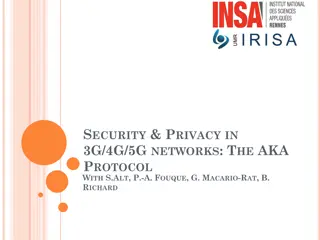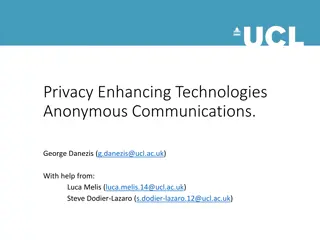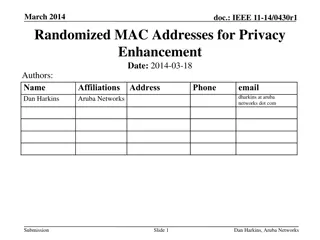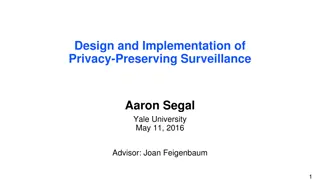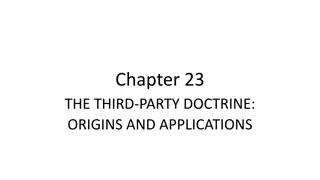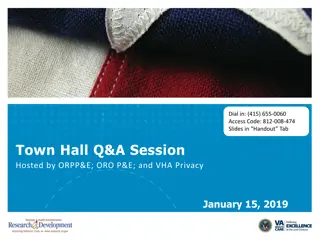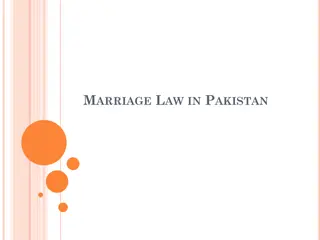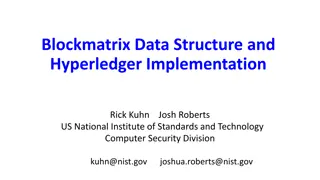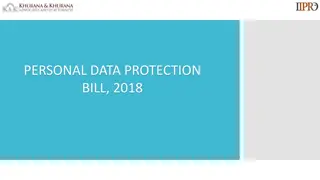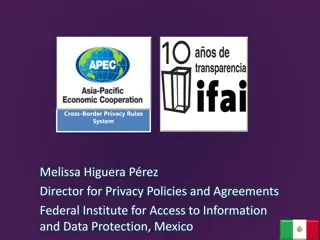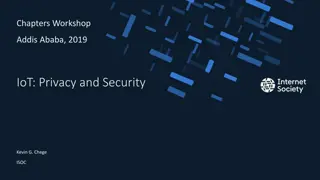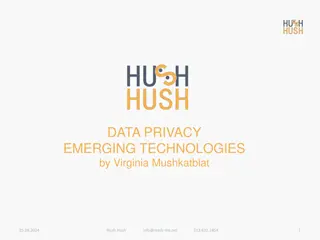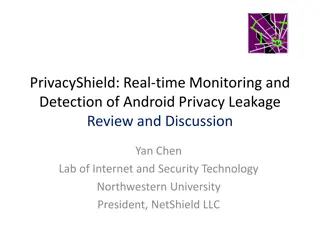Evolution of Education Data Privacy Laws in the U.S.
Explore the historical evolution of education data privacy laws in the U.S., focusing on the IDEA and FERPA statutes. Delve into the commonalities and changes over the years, from the passing of FERPA in 1974 to the latest amendments in 2013. Gain insights on how these laws shape data sharing practices in early childhood education.
Download Presentation

Please find below an Image/Link to download the presentation.
The content on the website is provided AS IS for your information and personal use only. It may not be sold, licensed, or shared on other websites without obtaining consent from the author. Download presentation by click this link. If you encounter any issues during the download, it is possible that the publisher has removed the file from their server.
E N D
Presentation Transcript
IDEA & FERPA -- Early Childhood Data Sharing December 17, 2014 Meredith Miceli, OSEP Frank Miller, FPCO Jessica Spataro, OSERS Kala Surprenant, OGC This presentation by U.S. Department of Education representatives reviews the applicable requirements under the IDEA and FERPA statute and regulations and does not establish or confer any additional rights other than those in these applicable laws. Kindly do not copy without attribution.
How do we work together? IDEA Part C IDEA Part B FERPA Kindly do not copy without attribution.
Our Goals IDEA and FERPA have a lot in common. How do you read them together when facing a new issue/Q? Kindly do not copy without attribution.
Who are we? IDEA Part C Enacted 1986, last amended 2004 Last major regulations in 2011 IDEA Part B Enacted 1975, last amended 2004 Last major regulations in 2006 FERPA Enacted 1974, last amended 2013 Last regulations in 2011 Kindly do not copy without attribution.
The World Has Changed When IDEA Part C was passed in 1986: Ronald Reagan was president of the US Nintendo introduced video games to America IBM unveiled its PC- 1st laptop computer Charlotte Church, the Olsen twins, and Lindsay Lohan were born Top Gun was the top grossing film Kindly do not copy without attribution.
The World Has Changed When EHA (now IDEA, Part B) was passed in 1975: Gerald Ford was President One Flew Over The Cuckoo's Nest won the big five Oscars - Best Picture, Best Director, Best Actor, Best Actress and Best Writing Angelina Jolie and Bradley Cooper were born. Popular holiday gifts were pet rocks and mood rings. Jaws was the top grossing film. Kindly do not copy without attribution.
The World Has Changed When FERPA was passed in 1974: Richard Nixon resigned; Gerald R. Ford became President Hank Aaron hit 715th home run to beat Babe Ruth's record People magazine was 1st published Kate Moss, Alanis Morissette, Leonardo DiCaprio, & Ryan Seacrest were born Blazing Saddles was the top grossing film Kindly do not copy without attribution.
Where can you find us? IDEA Part C Statute: Regulations: 34 C.F.R. 303.400 303.417 IDEA Part B Statute: 20 U.S.C. 1401 et seq. Regulations: 34 C.F.R 300.610 - 300.627 FERPA Statute: 20 U.S.C. 1232g Regulations: 34 C.F.R. Part 99 20 U.S.C. 1401-1407, 1417 & 1431 1443 Kindly do not copy without attribution.
What is Personally Identifiable Information (PII)? FERPA IDEA PART C 20 U.S.C. 1400 and 34 CFR Part 303 IDEA PART B 20 U.S.C. 1400 and 34 CFR Part 300 20 U.S.C. 1232g and 34 CFR Part 99 Kindly do not copy without attribution.
What Is Personally Identifiable Information (PII)? Address Mother s maiden name Name Social Security Number Date of birth Place of birth Names of parent or other family members Kindly do not copy without attribution.
What Else Is Personally Identifiable Information (PII)? FERPA - 99.3 (PII) Info. that, alone or in combination, is linkable to a specific student that would allow a reasonable person in the school community, who does not have personal knowledge of the relevant circumstances, to identify the student with reasonable certainty. Info. requested by a person who the educational agency or institution reasonably believes knows the identity of the student to whom the education record relates. Kindly do not copy without attribution.
What Else Is Personally Identifiable Information (PII)? IDEA Part C - 303.32 PII definition refers to FERPA PII definition Except-- student=child school=EIS provider IDEA Part B - 300.29 List of personal characteristics or other information that would make it possible to identify the child with reasonable certainty Kindly do not copy without attribution.
Different Rules IDEA Part CIDEA Part B FERPA Who? What? When? Kindly do not copy without attribution.
What records are covered? IDEA PART C 20 U.S.C. 1400 and 34 CFR Part 303 IDEA PART B 20 U.S.C. 1400 and 34 CFR Part 300 FERPA 20 U.S.C. 1232g and 34 CFR Part 99 Kindly do not copy without attribution.
What records are covered? FERPA Education Records IDEA Part B Education Records IDEA Part C Early Intervention Records Records that are Directly related to student; and Maintained by an educational agency or institution or by a party acting for the agency or institution 99.3 The type of records covered under the definition of education records in FERPA. All records regarding a child that are required to be collected, maintained, or used under Part C. Records that are collected, maintained, or used 300.611(b) 303.403(b) Kindly do not copy without attribution.
Who must comply? IDEA PART C 20 U.S.C. 1400 and 34 CFR Part 303 IDEA PART B 20 U.S.C. 1400 and 34 CFR Part 300 FERPA 20 U.S.C. 1232g and 34 CFR Part 99 Kindly do not copy without attribution.
Who must comply? IDEA Part C Participating agency Any individual, agency, entity, or institution that collects, maintains, or uses personally identifiable information to implement the requirements in part C. Includes any individual or entity that provides any part C services. Does not include primary referral sources or public agencies or private entities that act solely as funding sources for Part C services. Kindly do not copy without attribution.
Who must comply? IDEA Part B Participating agency Any agency or institution that collects, maintains, or uses personally identifiable information, or from which information is obtained under Part B. Kindly do not copy without attribution.
Who must comply? FERPA Educational agency or institution Any public or private agency or institution that provides educational services and/or instruction to students; or is authorized to direct and control public elementary or secondary, or postsecondary educational institutions; and to which funds have been made available under any program administered by the Secretary Kindly do not copy without attribution.
When do the confidentiality provisions apply? IDEA PART C 20 U.S.C. 1400 and 34 CFR Part 303 IDEA PART B 20 U.S.C. 1400 and 34 CFR Part 300 FERPA 20 U.S.C. 1232g and 34 CFR Part 99 Kindly do not copy without attribution.
When do the confidentiality provisions apply? IDEA Part C When the child is referred for early intervention services... Until the later of when the participating agency is no longer required to maintain or no longer maintains that information under applicable Federal and State laws 303.401(c)(2) Kindly do not copy without attribution.
When do the confidentiality provisions apply? IDEA Part B confidentiality provisions Apply to records that are collected, maintained, or used 300.610 through 300.626 Kindly do not copy without attribution.
When do the confidentiality provisions apply? FERPA When the student is in attendance at an educational agency or institution 99.3 (Definition of student) Kindly do not copy without attribution.
Whose records are covered? IDEA PART C 20 U.S.C. 1400 and 34 CFR Part 303 IDEA PART B 20 U.S.C. 1400 and 34 CFR Part 300 FERPA 20 U.S.C. 1232g and 34 CFR Part 99 Kindly do not copy without attribution.
Whose records are covered? IDEA Part C Child = An individual under the age of 6 and may include an infant or toddler with a disability 303.6 Kindly do not copy without attribution.
Whose records are covered? IDEA Part B Child with a disability: Children determined eligible under one of 13 disability categories & needs special education and related services as a result of disability. 300.8 Records relating to children that are collected, maintained or used 300.610 Kindly do not copy without attribution.
Whose records are covered? FERPA Student = Any individual who is or has been in attendance at an educational agency or institution and regarding whom the agency or institution maintains education records. 99.3 Kindly do not copy without attribution.
What are those rights/responsibilities? Confidentiality Review/amend records Retain records Dispute resolution Kindly do not copy without attribution.
What is confidentiality Consent definition FERPA IDEA PART C 20 U.S.C. 1400 and 34 CFR Part 303 IDEA PART B 20 U.S.C. 1400 and 34 CFR Part 300 20 U.S.C. 1232g and 34 CFR Part 99 Kindly do not copy without attribution.
What is confidentiality? Consent IDEA Part B & C Written Voluntary Informed Part C 303.7, Part B 300.9, Kindly do not copy without attribution.
What is confidentiality? Consent - FERPA Signed Dated Written 99.30 Kindly do not copy without attribution.
What are the exceptions to consent? IDEA PART C 20 U.S.C. 1400 and 34 CFR Part 303 IDEA PART B 20 U.S.C. 1400 and 34 CFR Part 300 FERPA 20 U.S.C. 1232g and 34 CFR Part 99 Kindly do not copy without attribution.
Exceptions to Consent IDEA Part C Remember definition of participating agency Transition notification/opt out FERPA exceptions - Translation provisions (e.g., school officials) 303.14(b) Kindly do not copy without attribution.
IDEA Part C Translation provisions Crosswalk of Terms FERPA IDEA Part C Education Record Education Educational agency or institution School official Early intervention record Early intervention Participating agency Qualified early intervention service (EIS) personnel/Service coordinator State educational authority Student Lead agency Child under IDEA Part C Kindly do not copy without attribution.
Exceptions to Consent IDEA Part B Officials of participating agency Age of majority FERPA exceptions 303.622(b)(1) and (2) Kindly do not copy without attribution.
Exceptions to Consent FERPA a number of exceptions including: Audit and Evaluation Uninterrupted Scholars Act Compliance with Judicial Order/Subpoena Health/safety 99.31 Kindly do not copy without attribution.
Exceptions to Consent FERPA Audit and Evaluation Federal, State, and local officials listed under 99.31(a)(3), or their authorized representative, may have access to education records only in connection with an audit or evaluation of Federal or State supported education programs, or for the enforcement of or compliance with Federal legal requirements which relate to those programs. Kindly do not copy without attribution.
Exceptions to Consent FERPA Uninterrupted Scholars Act Permits disclosure of PII from education records of children in foster care to: agency caseworker or other representative of a State or local child welfare agency (CWA) who has the right to access a student s case plan under State or tribal law. Disclosure permitted when: the CWA is legally responsible for the care and protection of the student. Kindly do not copy without attribution.
Exceptions to Consent FERPA Compliance with Judicial Order/Subpoena School may disclose PII from education records necessary to comply with a judicial order or lawfully issued subpoena. School must make a reasonable effort to notify the parent or eligible student of the order or subpoena before complying with it in order to allow parent or eligible student opportunity to seek protective action. Kindly do not copy without attribution.
Exceptions to Consent FERPA Health and Safety Emergencies Disclosure is necessary to protect the health or safety of the student or others. There is an articulable and significant threat to the health or safety of a student or other individuals. Appropriate parties typically means local, State, or federal law enforcement, trained medical personnel, public health officials, and parents. Must be related to an actual, impending, or imminent emergency. Kindly do not copy without attribution.
What are the rights regarding access to records? IDEA PART C 20 U.S.C. 1400 and 34 CFR Part 303 IDEA PART B 20 U.S.C. 1400 and 34 CFR Part 300 FERPA 20 U.S.C. 1232g and 34 CFR Part 99 Kindly do not copy without attribution.
When can the records be reviewed ? IDEA Part C Inspect and review any early intervention records collected, maintained, or used by the agency without unnecessary delay and before any meeting regarding an IFSP, or any due process hearing, and in no case more than 10 days after the request has been made. 303.405 Kindly do not copy without attribution.
What about copies of the records? IDEA Part C Participating agency -- May charge a fee for copies of records that are made for parents under this part if the fee does not effectively prevent the parents from exercising their right to inspect and review those records, except as provided in paragraph (c) of this section. May not charge a fee to search for or to retrieve information. Must provide at no cost to parents, a copy of each evaluation, assessment of the child, family assessment, and IFSP as soon as possible after each IFSP meeting. Must make available at no cost an initial copy of early intervention record. 303.400(c) and 303.409 Kindly do not copy without attribution.
When can the records be reviewed ? IDEA Part B Inspect and review any education records that are collected, maintained, or used by the agency without unnecessary delay and before any meeting regarding an IEP, or any due process hearing, or resolution session, and in no case more than 45 days after the request has been made. 300.613 Kindly do not copy without attribution.
What about copies of the records? IDEA Part B Participating agency May charge a fee for copies unless imposing a fee effectively prevents a parent or eligible student from exercising his or her rights to inspect and review education records. May not charge a fee to search for or to retrieve the education records of a student. 300.617 Kindly do not copy without attribution.
When can the records be reviewed ? FERPA Inspect and review education records, within 45 days of receiving a request. 99.10 Kindly do not copy without attribution.
What about copies of the records? FERPA Educational agency or institution -- - May charge a fee for copies unless imposing a fee effectively prevents a parent or eligible student from exercising his or her rights to inspect and review education records. - May not charge a fee to search for or to retrieve the education records of a student. 99.10 Kindly do not copy without attribution.
What if the records don t seem correct? FERPA IDEA PART C 20 U.S.C. 1400 and 34 CFR Part 303 IDEA PART B 20 U.S.C. 1400 and 34 CFR Part 300 20 U.S.C. 1232g and 34 CFR Part 99 Kindly do not copy without attribution.
What if the records don t seem correct? IDEA Parts C and B A parent who believes that the information in the record is inaccurate, misleading, or violates the privacy or other rights of the child can request that the record be amended. The agency must decide whether to amend the information within a reasonable period of time. If the agency refuses to amend the information, it must inform the parent of the refusal and advise the parent of right to a hearing. After hearing, if decision is still not to amend, parent has a right to insert a statement in the record. Cannot seek to amend substantive decisions, such as determination of IDEA eligibility or goals on the IEP/IFSP, etc. 303.410 (Part C) & 300.618 (Part B) Kindly do not copy without attribution.
What if the records don t seem correct? FERPA A parent or eligible student who believes that the information in the record is inaccurate, misleading, or violates the privacy rights of the student can request that the record be amended. The educational agency/institution must decide whether to amend the information within a reasonable period of time If educational agency/institution decides not to amend, it must inform parent of the refusal and right to a hearing. After hearing, if decision is still not to amend, parent has a right to insert a statement in the record. Cannot seek to amend substantive decisions, such as grades, etc. 99.20, 99.21, & 99.22 Kindly do not copy without attribution.
